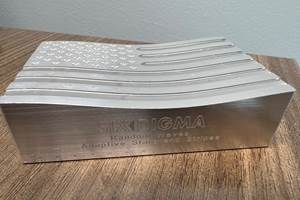Solving the Skills Gap Means Prioritizing Value Over Price
Manufacturing companies need to invest and add value to educational machine shop programs to solve the skilled labor gap.
Share





One of the most prevalent trends in the industry, which impacts many a machine shop, is the struggle to find skilled labor. No matter the circumstance, it seems that this lack of skilled labor has prevented shops from moving forward with business opportunities. I believe this problem stems from a lack of young people making skilled trades a destination, which means that the amount of people in skilled trades gets smaller every year. This is very frustrating for all businesses, and many shop owners are actively seeking resources for skilled laborers or even entry-level employees that can be trained into skilled laborers. The obvious place to start is at the high school level, and this is where you may find the problem begins.
I have visited many school shop programs, and in a number of cases, I have found that school shops are run down, underfunded and fail to show impressionable young people a desirable destination in skilled trades. Oftentimes, they show quite the opposite, which deters them from considering a path in the skilled trades altogether.
I believe this problem starts at the school investment level, as it seems that the education system is trying to squeeze out the best price for equipment for its shops, and this is causing many problems. These problems begin with equipment being of low quality and hard to maintain. If we are going to put equipment into schools, we need to look at the value and not just the price. We need to set criteria on purchasing equipment, which will help us attract young people to skilled trades.
One such company providing this value is Haas Automation. Haas is successful at equipping school shop programs because of several reasons, including:
- Haas has national distribution and service in North America. This is important because many school shops use equipment with no service support or parts availability. It is really bad when a school purchases equipment and the equipment becomes useless because service and parts are not available when it breaks down. It is hard to teach a course on equipment that is not working, and it is equally as hard for students to learn with it.
- Haas uses an industrial control on its machines. Here again, students are exposed to controls that are used in machine shops all over North America. I have seen many school shops that use CNC controls that would never be found in a machine shop. Exposing students to an industrial control, which many shops use, provides them with experience they can take into the real world. Machine shops that use Haas machines would benefit from taking a chance on a young person who has experience with a similar control to the one their own shop uses. Haas also offers certifications to students, which really help when it comes to standing out to an employer, as they show that the student has been exposed to their CNC control and has been tested. Young people would greatly benefit from having qualified, real-world credentials on their resume, so this is a great incentive for them to take shop classes that can offer this.
- Haas has the Haas Technical Education Community (HTEC). This is a community of manufacturing technology educators which has been established to help transform classrooms into high-tech, advanced labs that provide CNC education. Educators and teachers have access to classroom materials and training, as well as opportunities to network and share best practices with other educators nationwide. This is a totally valuable resource for teachers who are just starting off with their new pieces of equipment, or for enticing schools to buy machines and begin their CNC journey so young people can see a future for themselves in skilled trades.
- Haas is a give-back organization. Haas also has a foundation that gives back to education through scholarships, naming rights, community grants, technical conferences and skills competition sponsorships. This goes a long way in showing young people, institutions and educators that they are supported, which benefits machine shops in the long run.
I’m sure there are many other companies that offer similar resources to school shops around the world, and while this value does come at a higher initial cost, I believe the benefits far exceed the cost in every way.
The critical issue is this: Manufacturers need to start looking at proper investments in educational machine shop programs. Equipment and support needs to fit the goal of attracting young, employable people to skilled trades so our industries have the capability to compete on a global scale. Purchasing for education should be done on value and not on price. Support companies who make a commitment to the future of manufacturing through their support of education.
Related Content
Building Machines and Apprenticeships In-House: 5-Axis Live
Universal machines were the main draw of Grob’s 5-Axis Live — though the company’s apprenticeship and support proved equally impressive.
Read MoreHow I Made It: Nushrat Ahmed: CNC Swiss Operator
By day, 21-year-old Nushrat Ahmed is a CNC Swiss operator making automotive parts. By night, she handcrafts crocheted items.
Read MoreFinding the Right Tools for a Turning Shop
Xcelicut is a startup shop that has grown thanks to the right machines, cutting tools, grants and other resources.
Read MoreDN Solutions Responds to Labor Shortages, Reshoring, the Automotive Industry and More
At its first in-person DIMF since 2019, DN Solutions showcased a range of new technologies, from automation to machine tools to software. President WJ Kim explains how these products are responses to changes within the company and the manufacturing industry as a whole.
Read MoreRead Next
How I Made It: Dennis Rymanowski
Dennis Rymanowski has worked at NSH USA for 60 years, with his passion for manufacturing living alongside his passion for his family’s polka band.
Read MoreA New Frontier in Surface Finish Control
What if your machine tool could measure surface roughness as it cuts? This article explores how in-process metrology is advancing from concept to reality, enabling real-time feedback, immediate detection of anomalies and new levels of control over surface quality. Discover the technologies making this possible.
Read More




















